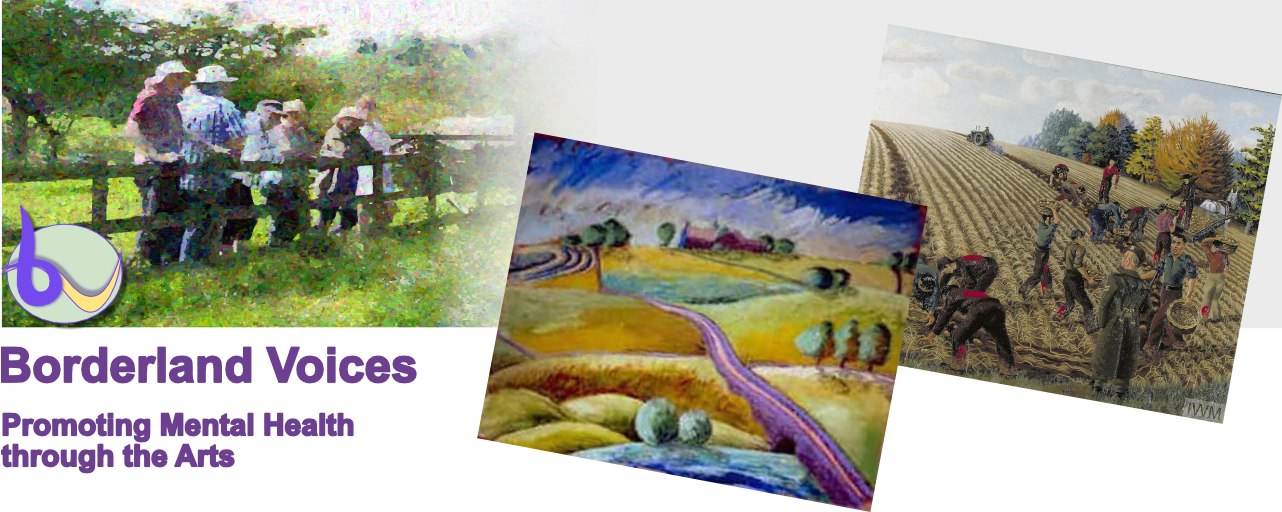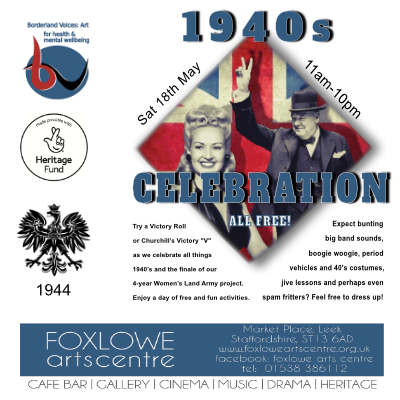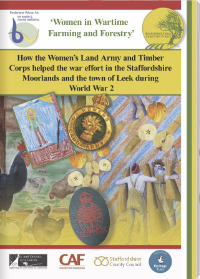
History of the Women’s Land Army (WLA) in and around Leek Project
After nearly 4 years the History of the Women’s Land Army (WLA) in and around Leek project is complete. In spite of the hiatus imposed by Covid, we worked with Borderland Voices participants, school children, Guides and Brownies and the general public to raise awareness in a fun and engaging way. We also undertook to explore mental well-being, then and now, and Covid suddenly brought this into sharp relief. As we spent months in lockdowns, isolated and scared, we could more easily imagine the loneliness and terror felt by many Land Girls. So this work showcases not only images and creative writing about the WLA, but also a mirror on the pandemic we lived through.
As arts for mental well-being is Borderland Voices’ mission, we undertook to explore the local WLA history creatively. Creativity ranged widely and included writing, 2D visual arts, 3D models, unusual crafts such as basketry and making updated scarecrows, plus horticulture, exploring changes in agricultural practices, wood turning and making (and eating) wartime recipes.
engaging way. We also undertook to explore mental well-being, then and now, and Covid suddenly brought this into sharp relief. As we spent months in lockdowns, isolated and scared, we could more easily imagine the loneliness and terror felt by many Land Girls. So this work showcases not only images and creative writing about the WLA, but also a mirror on the pandemic we lived through.
As arts for mental well-being is Borderland Voices’ mission, we undertook to explore the local WLA history creatively. Creativity ranged widely and included writing, 2D visual arts, 3D models, unusual crafts such as basketry and making updated scarecrows, plus horticulture, exploring changes in agricultural practices, wood turning and making (and eating) wartime recipes.
Culminating in a 1940s Celebration Fun Day which attracted 1300 people.
Another major output from the Project is our booklet entitled
“How the Women’s Land Army and Timber Corps helped the war effort in the Staffordshire Moorlands and the town of Leek during World War 2”
These videos were also generated throughout the duration of the project
https://youtu.be/R3Iso2Wx_40 (pandemic writing)
https://youtu.be/AhtEMMEu7po (WLA writing)
https://youtu.be/jcGsrOdIlr4 (40s Day)
https://youtu.be/4LxJb_7QKpw (reminiscences
Borderland Voices History of the Women’s Land Army (WLA) in and around Leek was made possible with The National Lottery Heritage Fund. Thanks to National Lottery players, we have been able to complement research and reminiscence with creativity, verbal and visual, both from regular participants and the wider public, adults and young people.

------------------------------------------------------
.jpg) In the Second World War, though under the Ministry of Agriculture and Fisheries, the Women’s Land Army was given an honorary head – Lady Denman. At first it asked for volunteers. This was supplemented by conscription, so that by 1944 it had over 80,000 members. The WLA lasted until it was officially disbanded on 21 October 1949. The Women’s Timber Corps worked in the forestry industry. Its members were colloquially known as "Lumber Jills". It was a branch of the Women's Land Army that operated 1942–46.
Our project, beginning when the WLA restarted in 1939, will seek out reminiscences; these may come from those who, as local country children, encountered the Land Girls, or descendants of Land Girls who settled in the area. This research will generate podcasts and inspire creative activity (writing, art, photography) for an exhibition and booklet.
In the Second World War, though under the Ministry of Agriculture and Fisheries, the Women’s Land Army was given an honorary head – Lady Denman. At first it asked for volunteers. This was supplemented by conscription, so that by 1944 it had over 80,000 members. The WLA lasted until it was officially disbanded on 21 October 1949. The Women’s Timber Corps worked in the forestry industry. Its members were colloquially known as "Lumber Jills". It was a branch of the Women's Land Army that operated 1942–46.
Our project, beginning when the WLA restarted in 1939, will seek out reminiscences; these may come from those who, as local country children, encountered the Land Girls, or descendants of Land Girls who settled in the area. This research will generate podcasts and inspire creative activity (writing, art, photography) for an exhibition and booklet.
Our Project
The project is due to start in Spring 2020 however the Covid 19 situation will affect the timetable.
The Aims will be:
1. To preserve the personal histories in Leek/North Staffordshire of the Women’s Land Army.
2. To rediscover and record the stories of the women’s roles.
3. To enable local communities in North Staffordshire to participate in a heritage project based on these stories and memories, together with war time art, local historical documents, personal artefacts and photographs.
4. To enable local communities and a wider audience to learn about the heritage of their local Land Army personnel by creating a publication, as well as exhibitions, an updated website and podcasts.
5. To enable Leek High School students to learn about the history of women who served during WW2 in their communities and how the landscape altered.
6. To create a public archive of the information.
7. To manage other professionals to train volunteers in local history research, interpretation and IT skills and organise sessions for participants.
8. To organise delivery of creative workshops (writing and art) inspired by this heritage, for Borderland Voices participants and the public.

